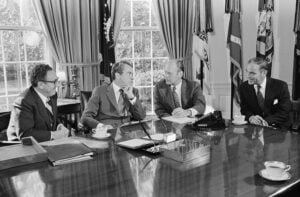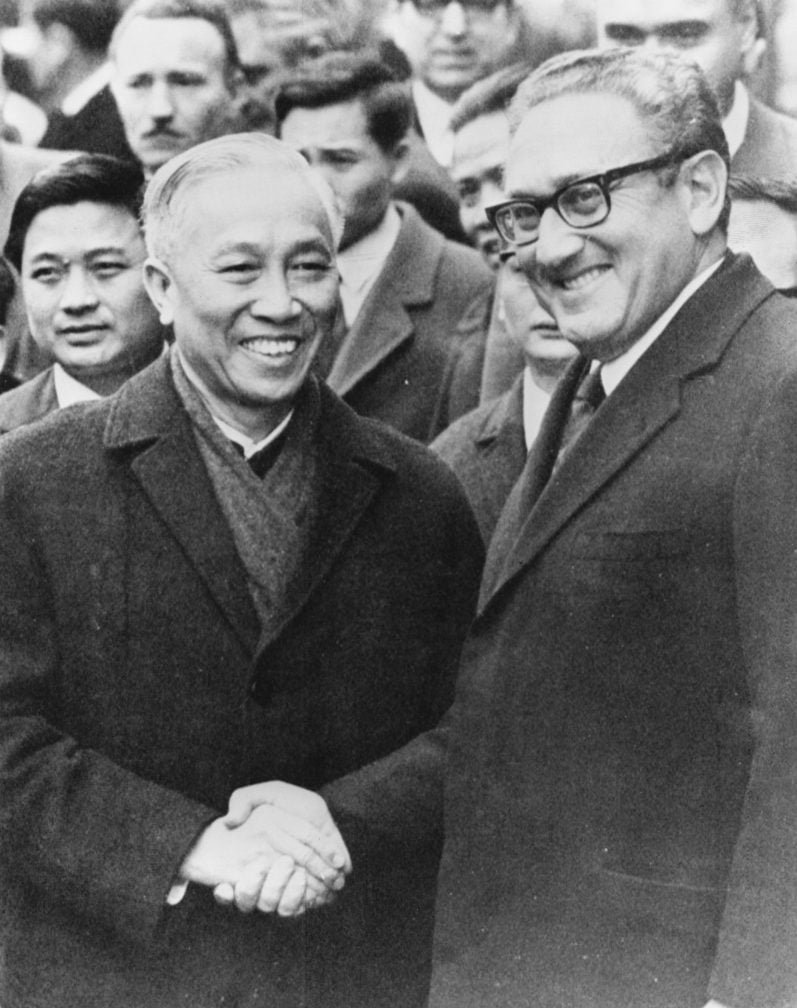Throughout the pages of history, there are individuals who navigate a tightrope between being hailed as heroes or condemned as villains. Henry Kissinger, the former Secretary of State for the United States, embodies this duality. While some view him as a mastermind strategist and skilled diplomat, others hold him accountable for acts deemed criminal, resulting in the loss of lives. Given that American authorities persist in endorsing Kissinger’s policies and beliefs, his influence continues to shape our present-day narrative.
Henry Kissinger and The Nobel Peace Prize Paradox
The Nobel Peace Prize awarded to Kissinger has always been a puzzling aspect of his legacy. In 1973, he received this recognition for his involvement in brokering a ceasefire during the Vietnam War. However, it is crucial to delve into the circumstances surrounding this ceasefire in order to gain an understanding of Kissinger’s actual actions.
The Vietnam War: A Legacy of Tragedy
The Vietnam War was a period in history characterised by extensive violence and the tragic loss of numerous lives. It is important to recognise the impact of Kissinger’s role in shaping US policy during this challenging time. From 1955 to 1975, the war resulted in the deaths of more than 2 million Vietnamese civilians and soldiers, along with tens of thousands of US military personnel.

Kissinger’s Role: The Bombing Campaigns
One of the most damning aspects of Kissinger’s legacy is his involvement in the bombing campaigns that ravaged Vietnam, Cambodia, and Laos. The bombings, known as Operation Rolling Thunder and Operation Linebacker, resulted in the deaths of hundreds of thousands of innocent civilians. These operations were characterised by indiscriminate targeting, leading to the destruction of villages, schools, and hospitals.
The secret bombings carried out in Cambodia during the 1960s and 1970s stand as one of the most appalling actions attributed to Kissinger. These bombings involved dropping 2.7 million metric tonnes of bombs on territory, resulting in widespread devastation and an estimated death toll of around 200,000 individuals. What makes these bombings particularly egregious is that they were conducted without the knowledge or consent of the public, clearly disregarding the law.
To comprehend Kissinger’s actions, it is essential to delve into his worldview and ideology. Kissinger was an advocate of realpolitik, a theory that places power pursuit and national interests above moral considerations. According to this ideology, any means necessary are justified if they lead to ends for the state.
Kissinger’s diplomatic approach drew heavily from the teachings of Niccolò Machiavelli, the political philosopher from the 16th century who authored “The Prince.” Machiavelli emphasised cunning, manipulation, and even deception as tools for achieving goals. Kissinger skillfully applied these principles in his negotiations with leaders, earning himself a reputation as an unyielding diplomat.
The Balance of Power
Another important aspect of Kissinger’s ideology was his belief in the balance of power. According to him, maintaining stability in relations required an equilibrium between nations. This sometimes meant supporting governments and overlooking human rights violations in order to preserve stability. Critics argue that this approach prioritised the interests of the ruling class over the rights and welfare of people.
The Legacy Lives On
Despite the controversies surrounding his actions, Kissinger’s ideas and policies continue to shape US policy. His pragmatic approach has influenced administrations through elements of his strategies in how the US engages with countries like China, Iran, and Russia. The pursuit of power and a willingness to compromise rights in pursuit of interests remain prominent themes in modern US foreign policy.
Frequently Asked Questions (FAQ)
1. Was Kissinger directly responsible for the bombings in Vietnam?
Yes, Kissinger played a pivotal role in planning and executing the bombing campaigns in Vietnam, which resulted in the deaths of countless innocent civilians.
2. How did Kissinger receive a Nobel Peace Prize despite his controversial actions?
Kissinger’s Nobel Peace Prize was awarded for his role in negotiating a ceasefire during the Vietnam War. However, many argue that this award was a paradox, as his actions during the war caused widespread death and destruction.
3. Did Kissinger’s realpolitik approach have any positive outcomes?
Supporters of Kissinger argue that his realpolitik approach helped maintain stability during the Cold War and prevented a direct confrontation between the United States and the Soviet Union.
4. Are there any ongoing investigations into Kissinger’s actions?
While there have been calls for investigations into Kissinger’s actions and potential war crimes, no formal legal action has been taken against him. Some argue that his status as a former high-ranking government official grants him immunity from prosecution.
5. How has Kissinger’s legacy influenced US foreign policy today?
Kissinger’s ideas and policies, particularly his realpolitik approach, have had a lasting impact on US foreign policy. The prioritisation of national interests over moral considerations can still be observed in the way the US engages with other countries, particularly in matters of geopolitics and power dynamics.
Conclusion: A Complex Legacy
Henry Kissinger’s impact on history is undoubtedly complex and controversial. While some recognise his achievements, such as establishing relations with China, there are concerns about his involvement in the Vietnam War and his realpolitik approach, which has led to accusations of war crimes and disregard for rights. The fact that he was awarded the Nobel Peace Prize continues to be a subject of debate since it seems contradictory to the actions he took while serving as Secretary of State.
As we contemplate Kissinger’s legacy, it is crucial for us to critically evaluate our values and moral principles. The pursuit of power and national interests should never come at the expense of lives or a violation of the law. It is by learning from history that we can strive for a future that prioritises peace, justice, and respect for rights.
For more updates, please stay connected with us. and read my blog regularly.

